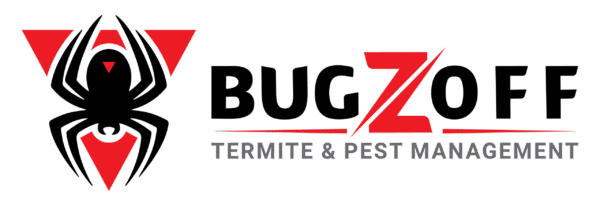Stink Bugs
Stink Bugs – The Persistent Pests with a Nasty Odour
Stink bugs are shield-shaped insects belonging to the Pentatomidae family. They are best known for the foul-smelling odour they release as a defence mechanism when they are disturbed or crushed. While they do not bite or sting, stink bugs can become a significant nuisance when they invade homes in large numbers.
These pests are commonly found in gardens, forests, and agricultural areas, where they feed on fruits, vegetables, and crops, causing economic damage to farmers and gardeners. They also tend to seek shelter indoors during cooler months, making them unwanted houseguests.
At BUGZOFF Pest Control, we provide specialised stink bug treatment and prevention strategies, ensuring your home, business, and crops remain protected from these troublesome pests.
Why Are Stink Bugs a Problem?
Stink bugs are not directly harmful to humans, but they can cause several issues:
- Home Infestations – Stink bugs tend to gather in large numbers, especially during autumn and winter, when they look for warm indoor spaces.
- Unpleasant Odour – When threatened or crushed, stink bugs release a strong, pungent smell that can linger in homes, offices, and vehicles.
- Crop & Garden Damage – Stink bugs feed on fruits, vegetables, and plant leaves, reducing crop yields and market value.
- Stains & Mess – Their secretions can leave stains on walls, fabrics, and furniture, making them a frustrating nuisance indoors.
Common Stink Bug Species in Australia
Brown Marmorated Stink Bug (Halyomorpha halys) – The Major Agricultural Pest
- An invasive species known for its widespread crop destruction.
- Feeds on over 300 plant species, including fruits, vegetables, and grains.
- Shield-shaped with a distinctive marbled brown pattern.
- Known to invade homes in large numbers, particularly in autumn and winter.
Green Stink Bug (Nezara viridula) – The Garden Destroyer
- Bright green in colour with a triangular body marking.
- A common pest in gardens, attacking fruits, vegetables, and young plants.
- Causes wilting, leaf discolouration, and deformed fruits.
- Commonly found in urban, rural, and agricultural areas.
Red-Shouldered Stink Bug (Thyanta spp.) – The Ornamental Plant Feeder
- Easily identified by its red and black markings on the shoulders.
- Targets flowering plants, shrubs, and fruit trees, sucking plant sap and weakening foliage.
- Found in gardens, nurseries, and ornamental landscapes.
Banana Stink Bug (Musgraveia sulciventris) – The Foul-Smelling Crop Pest
- Native to Australia, frequently found in Queensland and New South Wales.
- Feeds on banana crops, macadamias, and other fruit trees.
- Produces an extremely foul-smelling secretion when disturbed.
Western Tarnished Plant Bug – The Fast-Spreading Pest
- Highly mobile stink bug species, capable of moving quickly between crops and gardens.
- Feeds on flowers, plant leaves, and young fruits, leaving damage and deformed growth.
- Difficult to control due to its rapid reproduction and movement.
Signs of a Stink Bug Infestation
Stink bugs are often hard to detect until they start appearing in large numbers. Watch for these warning signs:
- Clusters of stink bugs indoors, particularly around windows, ceilings, or light sources.
- Strong, unpleasant odour, often noticeable when stink bugs are disturbed or crushed.
- Damage to crops, fruits, or vegetables, including deformed produce, discoloured leaves, and small puncture marks.
- Small brown or black stains on walls, curtains, and furniture caused by stink bug secretions.
Problems Caused by Stink Bugs
Home Invasions & Nuisance Issues
- Stink bugs often sneak into homes during colder months, gathering in wall voids, attics, and basements.
- Their foul odour can be overwhelming, especially when they are squashed or disturbed.
Garden & Agricultural Damage
- Stink bugs pierce fruits, vegetables, and plants, leading to wilting, deformities, and loss of produce.
- Infestations in orchards, vineyards, and vegetable farms can result in significant financial losses.
Odour & Staining
- Their secretion not only smells bad but can also stain walls, fabrics, and upholstery.
- Stink bug secretions are difficult to remove and can linger for days.
How to Prevent & Control Stink Bugs
- Seal Entry Points
- Inspect windows, doors, vents, and cracks in walls for entry points.
- Use caulking, weatherstripping, or mesh screens to block access.
- Remove Outdoor Attractants
- Keep gardens tidy by removing weeds, fallen fruits, and decaying plants.
- Store firewood away from the house and clear leaves and debris from outdoor spaces.
- Use Sticky Traps
- Place sticky traps near windows, doorways, and other entry points to catch stink bugs.
- Dispose of trapped stink bugs properly to prevent odour contamination.
- DIY & Natural Repellents
- Essential oils like peppermint, clove, or citrus can help repel stink bugs.
- Spraying a mixture of dish soap and water directly onto stink bugs can eliminate them on contact.
- Professional Pest Control Solutions
- If DIY methods fail, or the infestation becomes widespread, professional pest control is the best long-term solution.
- Expert technicians can identify stink bug hiding spots, apply targeted treatments, and implement prevention strategies.
How BUGZOFF Can Manage Stink Bugs
At BUGZOFF Pest Control, we specialise in effective stink bug elimination using scientifically proven methods.
Our Stink Bug Control Services Include:
- Comprehensive Inspection & Assessment – Identifying infestation severity and access points.
- Interior & Exterior Treatments – Safe, targeted solutions for homes, gardens, and businesses.
- Preventative Solutions – Long-term strategies to prevent stink bug reinfestations.
- Ongoing Monitoring & Maintenance – Ensuring your property remains stink bug-free year-round.
Don’t Let Stink Bugs Take Over – Contact BUGZOFF Today!
If stink bugs are invading your home or damaging your garden, early action is crucial to prevent infestations from worsening. Their odour, nuisance, and agricultural destruction make them a pest you can’t ignore.
At BUGZOFF Pest Control, we offer tailored stink bug treatment plans, using the latest pest management techniques.
Contact BUGZOFF today for expert stink bug removal and prevention services!
Frequently Asked Questions
What are stink bugs?
Stink bugs are shield-shaped insects that emit a foul-smelling odour when disturbed. They can be a nuisance pest and can damage plants.
Are stink bugs harmful to humans?
Stink bugs are not known to bite humans, but they can be a nuisance and cause allergic reactions in some people.
How can I identify different types of stink bugs?
Stink bugs can be identified by their physical appearance, including their colour, shape, and markings. Refer to the species section for more information.
Prevention and Control
How can I prevent stink bugs from entering my home?
Seal cracks and crevices in your home to prevent stink bugs from entering.
What can I do if I find stink bugs in my home?
Use sticky traps or other methods to capture and eliminate stink bugs. For severe infestations, consider contacting a professional pest control service.
How can I prevent stink bugs from damaging my plants?
Use row covers or netting to protect your plants from stink bugs. You can also apply insecticides to your plants.
Can I kill stink bugs with pesticides?
Yes, insecticides can be effective at killing stink bugs. However, it is important to follow the instructions on the label carefully and to use insecticides in a safe and responsible manner.


